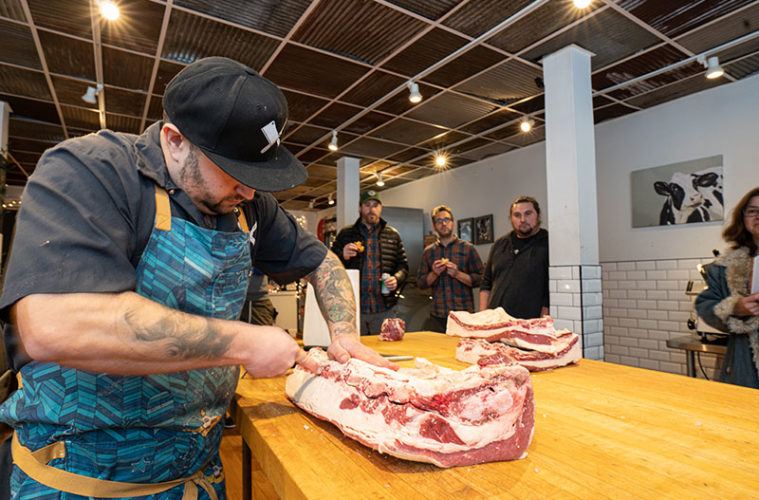Whole animal butchery is incredibly demanding work. Every week, Warren Means slings a whole cow—some 600 pounds, arriving as four slightly more manageable pieces—onto his butcher block, deftly carving it into steaks, roasts, and other delectable items to fill the case at The Modern Butcher.
“You’re basically working out all day, every day,” says Means, who quickly found that his powerlifting hobby was great job training when he and his fiancée/business partner Lisa Nichols opened the shop in 2019. “I immediately started losing weight and gaining muscle because, of course, you need it.”
The shop, which moved from Newburyport to Danvers this spring, takes delivery of at least one whole cow a week, a couple of pigs, and a bunch of chickens. All of the meat is raised within 150 miles of the North Shore, by farms that the couple has visited and by farmers that they’ve developed personal relationships with. It’s not easy, but Means and Nichols are uncompromising in their dedication to whole animals and the farmers who raise them.
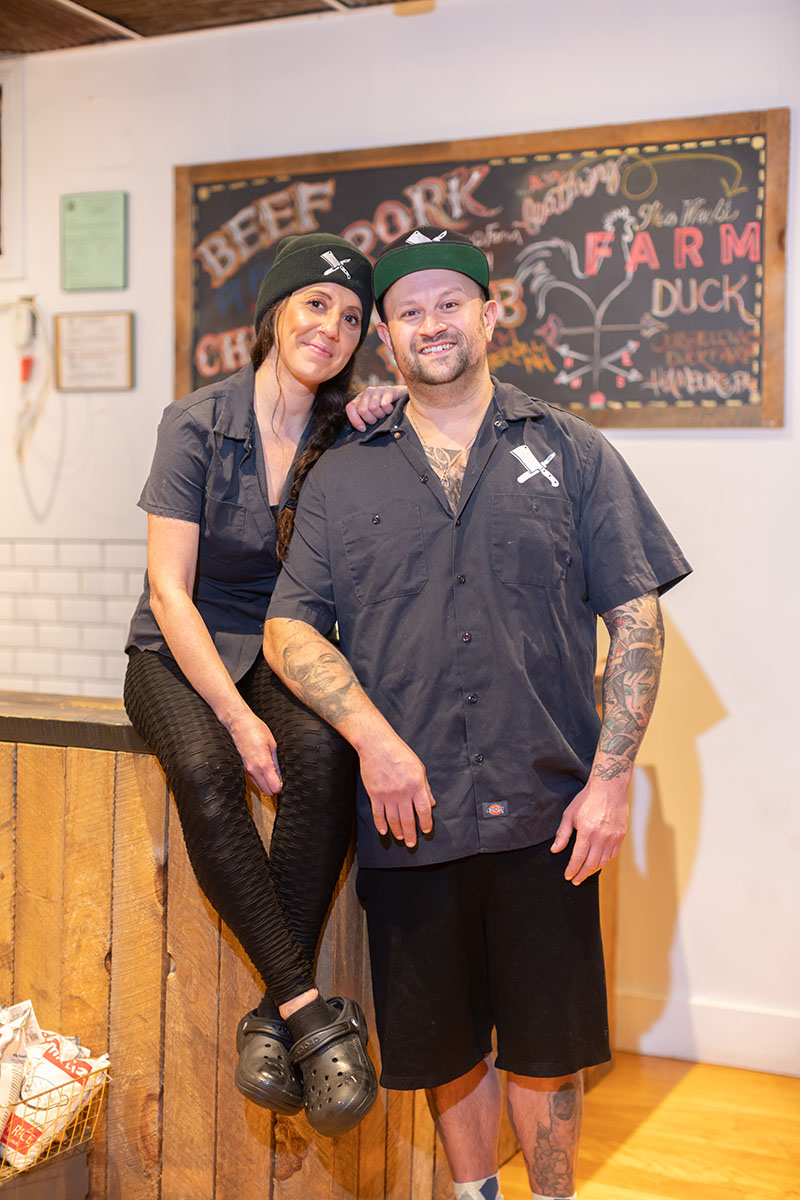
“It would definitely make more sense financially to sell only specific cuts, like rib-eye, New York strip, and tenderloin that you see in every butcher shop,” Nichols says. “But we feel like, if you’re going to take the life of an animal, honoring that is using every single piece.”
So, while you can definitely get a beautiful tenderloin, top-quality dry-aged steaks, and ground beef, you will also find some things you’ve never heard of—like kalbi ribs. This cut looks a little weird—a thin strip of meat interrupted by bumps of half-inch-thick rib bone—but it cooks up fast and tender. It’s actually made from something familiar—a Korean-style treatment of short ribs, in which the ribs are cut lengthwise, rather than the familiar fat bones in an American-style cross-cut. The result is perfect for the grill.
That’s just one way the butchers think about meat seasonally, because they buy whole animals. “Nobody is buying short ribs to braise in July, but we cut them in a different way, so you can cook them for just a minute or two minutes and they are like meat candy,” Nichols says. That flexible thinking has led to a lot of interesting innovations including beef belly bacon.

“We fly through pork bacon, so we needed another option,” Nichols said. They started curing and smoking the beef belly and wound up with a winner. “It’s like brisket and bacon had a baby,” she explains. “Personally, I think it’s better than regular bacon—it makes amazing BLTs in the summertime.” Another innovation are the wildly popular, highly unusual sausage offerings. Flavors like Hangover Breakfast, Black Garlic Butter with Smoked Gouda, and Dim Sum seem like a stoner’s dream, but actually came from a more wholesome place.
“Everything Lisa craved when she was pregnant, we turned into a sausage,” Means says with a laugh. “It was like some sort of a superpower.” And it’s now a staple of their shop: Every week people check social media to see what the sausages are, from regular offerings like the North End, a classic Italian pork sausage, to crazy flavors like Cinnamon Toast Crunch + Bacon or Mexican Street Corn. Beyond being a lot of fun, Means says the flavors introduce people to dishes from different cultures in an approachable way. “Because we’re able to put things like butter chicken and tikka masala in a very familiar thing, it encourages people to expand their horizons,” Means says, adding that his mom has become a fan of Thai food because she has tried his sausage.
Sausage is easy to grasp, but some of the other offerings are far less familiar. While anyone behind the counter is happy to explain all of the cuts and how to cook them, Means and Nichols offer a real in-depth peek at whole-animal butchery several times a month. At their popular classes, anyone can learn about which cuts come from which parts of the animal, and which are the best for different applications. The brave can even try sawing through bone or tasting a bit of raw beef—the freshest carpaccio you can imagine. The events generally happen several times a month, and include pork, beef, and a basic kitchen skills class that covers deboning a chicken, pork basics, and knife skills. They sell out fast and are especially appealing to people who have a home smoker or are really into barbecue.
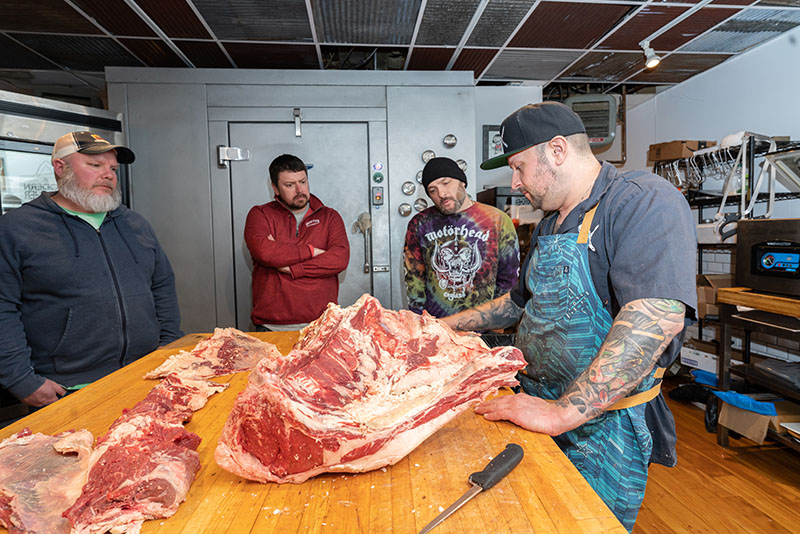
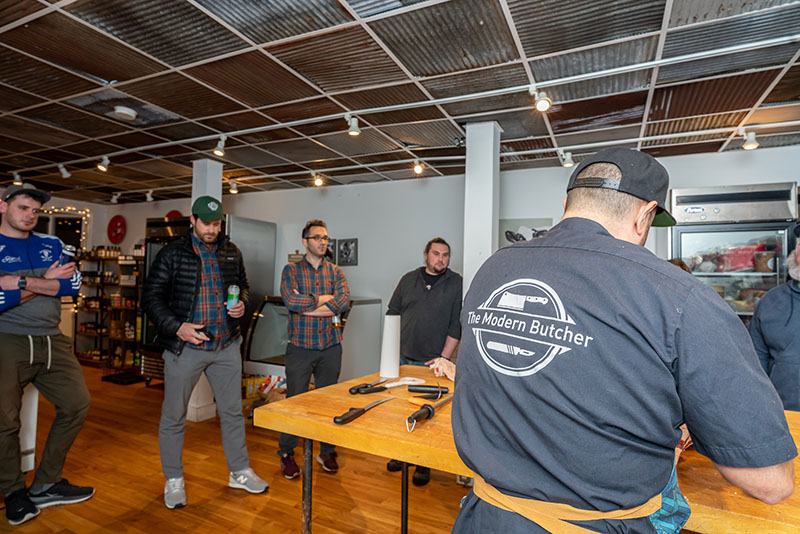
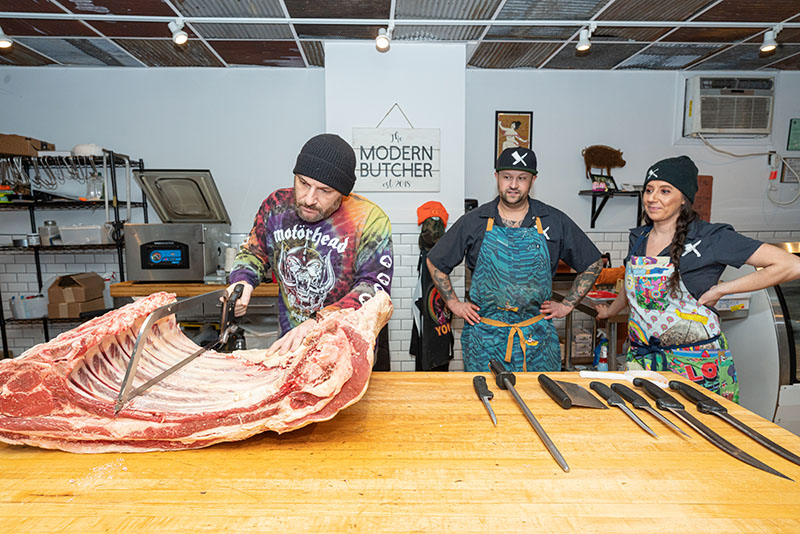
The classes are just one more way that the couple shares their mission, teaching customers to think seasonally and locally about meat in the same way they think about vegetables. That might mean being flexible sometimes—for example, about steak tips. When Nichols and Means first opened their shop, steak tips were not in the case. Not because they have anything against the Massachusetts staple, but because each cow only has about five pounds of “bavette,” or flap meat, where steak tips come from. They quickly learned that refusing to sell steak tips is a non-starter in the Bay State, so during the summer, they supplement their whole animals with additional bavette steaks, always from local producers. However, if you have an open mind, the butchers can suggest a cut that you might enjoy even more on the grill.
“If you want steak tips, you’re buying steak tips,” Means says. “But if you’re like, ‘What’s good on the grill?’ those are the conversations I like the most—not 'I want this cut,’ but ‘I’m making this. What do I use’?”
With a whole animal at their disposal, the butchers can provide just about any cut you can dream up. Means once fashioned a tomahawk roast crusted in edible gold leaf for a customer who wanted to recreate an Instagram-famous dish from Nusr-Et Steakhouse. “I’ll do anything,” Means says. Just catch him and ask before he butchers the animal. Or just suggest something perfect for dinner.
For more information visit themodernbutchershop.com or follow them on social media @themodernbutchershop.

